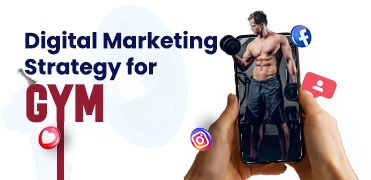"Social Media Marketing Tactics to Boost Engagement and Conversions"
The field of social media marketing presents a lot that businesses can take advantage of to boost engagement and conversions, as long as the business connects to its audience through efficient SMM, builds brand loyalty with its products or services, and achieves marketing goals. Always keep learning from your experience; adapting strategies to changing trends, and knowing what is right for social media platforms gives you an edge over the competition.
- .
- Wom
- .
- February 18, 2024

Introduction:
Marketing has become a powerful tool for businesses to connect with their audience, build brand awareness, and increase sales. Along with that, millions of active users are engaging with each other through various social media platforms such as Facebook, Instagram, and many more, where businesses are analyzing the chart of highly active audiences towards social media, bringing higher chances of converting their businesses online using different marketing tactics. In this blog, with our team, we are going to share some of our point-of-view on the importance of social media marketing in boosting engagement and sales, as well as the lessons and experiences of professional marketing tactics that can be beneficial for different kinds of organizations that have their presence online.
Social media marketing roles:
1) Content Creator:
Creators have the ability to create high-quality content that is easy for viewers to identify what they want, so when creating something new based on user interests, needs, and wants, according to their informative nature, they reflect the viewer’s attention and remain engaged. Regardless of whether it’s captions, visual graphics, and videos that capture the interest produced or world-building through innovative storytelling and creative expressions, a content creator plays an essential role in engaging viewers to promote brand awareness.
2) Community Manager:
A community manager should have a role in business growth, which remains vitally important for actively guiding the audience in different social networks. Social media engagement and interaction with your followers strengthen relationships between organizations and audiences to build loyalty toward brands. Furthermore, they can also facilitate discussions and queries from customers or even user-generated content to create better engagement and community participation, as well as brand promotion.
3) Analyst:
The analyst is tasked with keeping tabs on and analyzing the performance of social media metrics to assess marketing campaigns as well as overall application productivity. Through the monitoring of essential KPIs, like engagement rates, reach, and conversion indexes, Analysts can learn about audience behavior; understand new emerging trends as well evaluate different strategies’ success. The use of both real-time and post-action analytics allows them to ensure that they focus their resources on what brings better engagement by skillfully utilizing data-driven insights to make decisions. Like, how best social media strategy can be optimized, and how much it is perfected or improved in relation to its targeting approach and accuracy without excess cost. The Analyst performs constant analysis and adjustments to ensure that marketing initiatives meet the business goals while measuring concrete results in rapidly changing digital landscapes.
4) Strategist:
The strategist has a role that includes designing and implementing social media marketing strategies that are consistent with the larger business goals. The Strategist develops targeted strategies using insights into the target audience demographic, behavioral data, and a broad understanding of market dynamics to maximize engagement for determined objectives. They are up-to-date with current industry trends, competitor actions, and platform changes, which act as a guide on what to do. It is this relevance that makes them effective. The Strategist utilizes strategic planning and execution to position the brand for growth in a competitive digital era, building reputable brands that users are loyal to, thus enabling business entities to achieve their set goals.
5) Advertising Specialist:
Advertising specialists have a responsibility in terms of being the first to manage paid advertising campaigns across various social media platforms. This involves making, implementing, and fine-tuning ad campaigns to increase the size of an audience as well in order to improve conversion values. Ads Specialists help the company with their deep understanding of ad targeting, bidding strategies, and analytics insight on how best to optimize campaigns in order to increase their ROI toward pre-defined business goals. The ability to monitor and analyze campaign performance allows them to make data-driven corrections, leading to the best results. The successful management of ad budgets and understanding of the industry are key factors that make the advertising specialist a very important person in ensuring brand visibility and enhancing revenue growth through effective advertising campaigns.
Importance of Social Media Marketing:
1) Audience Reach:
Social media channels open the possibility of reaching out to an amazingly wide base of potential customers. Having billions of users around the world, these platforms offer excellent opportunities for businesses to interact and link with various audiences across different locations in the globe. With the help of social media platforms, businesses can stretch their brand presence across a large community enhancing exposure and attracting more potential customers from different directions. Social media marketing utilizes the capabilities of an international social community to allow businesses to achieve effective market presence, boosting brand recognition and eventually fuelling growth on a global scale.
2) Brand Visibility:
Social media offers the brand a constant presence, amplifying its visibility. With constant audience interactions, content sharing, and being part of relevant conversations businesses increase their online visibility to make sure that there is a brand recall from customers. The high visibility ensures brand recall and recognition, enabling the consumers to identify with it when making purchases. By implementing various social media efforts, businesses can build a solid reputation through the digital platform while keeping an identity that they should have and ensuring easier communication of their value proposition to potential customer base. This will help in establishing brand loyalty as well as growth.
3) Engagement Opportunities:
There are endless options for social engagement opportunities on various platforms, from one-time checks to completing long-duration campaigns through interaction likes, comments shares, and direct messages. These benefits enable effective engagement between businesses and their audience, allowing for real-time discussions, feedback, and relationship building. In engaging with these encounters, businesses can develop stronger relationships with their customers that provide them with useful insights and build loyalty towards the brand. In addition, interacting with audiences through social media plays an essential role through influencers for promotion, and it creates a feeling of truthfulness among people. This can improve engagement, and generate brand awareness and satisfaction ratings among customers, which are key to success in the digital environment.
4) Conversion Potential:
Conversion potential focuses on the ability of social media marketing to channel users thoughtfully through the sales funnel, with eventual boosts in sales and revenue. Through building focused campaigns, businesses create environments through different social media platforms to create opportunities. Businesses can successfully influence decision-making and increase conversions through content that is engaging personalized messages and targeted calls to action. By taking a conversion-led approach that turns engagement into real revenue and performance increases for businesses’ social platforms, this way companies can get the most return on their investment in these online communities.
5) Data Insights:
Businesses get heaps of useful information about their audience choices, behavior, and communication habits from data insights obtained using social media platforms. The evaluation parameters, including audience activity rates, demographics, and content performance, detail how to transmit information about engagement with this comprehensive approach. This insight helps organizations to make informed decisions, which helps them refine their marketing strategies based on audience needs and improve overall performance. These data insights can be used by businesses to improve their social media activities to drive more positive outcomes, increase engagement levels, and ultimately achieve a great return on investment in marketing efforts.
Social Media Strategy Towards the Real-world:
1) Define Objectives:
Goal setting refers to the process of planning clear and measurable objectives that are in line with your overall organizational purposes. When businesses set goals that would play an important role in their social media marketing campaign, they can have a blueprint of the direction along which to steer. This should always involve specific items such as raising awareness for the brand, increasing visits on-site and most importantly generating leads. These goals act as performance measures and help in deciding the direction of the campaign. Having well-planned goals, companies can pour their resources and activities towards realizing specific outcomes that can be measured besides allowing better progress tracking.
2) Know Your Audience:
Audience awareness is a process of extensive research into demographics, preferences, and online patterns. This knowledge allows businesses to produce content and messages that hit the intended point well. Through the study of aspects like age group, gender, preferences, and relationship practices businesses can customize their marketing plans to meet the needs or interests of a particular segment. This personalized approach improves engagement, fosters better relationships with clients, and results in a more effective marketing communication process to reach out and attract the target audiences.
3) Choose the right platforms:
Identify the most active online spaces where your target audience is located to determine which social media platforms to consider. Instead of guessing which platforms your audience finds appealing, you can also determine this through research so that you know where to target during the marketing process. By focusing on the platforms where your audience is most active, you can focus on limited marketing resources and make use of every opportunity on social media. The targeted approach guarantees that your messages are delivered to the right people in channels they would most likely respond to, thus significantly improving the impact of marketing.
4) Develop a content strategy:
Planning and developing a content strategy involves creating various types of formats of content targeted at your audience. The company provides customers with information about their brand value related to their products through advertising on different platforms. Because of various preferences and interests, you can use images, videos, social network posts, blogs, and infographics to appeal to them. This strategic approach makes sure that your content is appealing to users while still aligning with your brand identity. Through the delivery of meaningful and entertaining content in different formats, you can forge a better bond with your audience that results in increased engagement levels, which ultimately completes the achievement of your marketing goals.
5) Engage Consistently:
Constant interaction with your audience, however, is not simply limited to sharing content but also includes participating in conversations, reactions, and commenting on user-generated material. The frequency of your social media presence allows you to create engagement, trust, and a sense of community with followers. Starting conversations and also asking for feedback show that you want to establish relationships with your audience. Continuous interactions do not only help in elevating supporters but further increase the opportunity to pass your message via sharing and recommendation of your brand hence a successful formula for social media marketing.
6) Utilize Paid Advertising:
Businesses want to distribute their message wide and far across the web to find potential customers among various audiences, thus social media ads allow paid advertising through which organizations' advertisements are posted on Facebook or other kind of platforms. Through paying for advertisements, businesses will spend their budgets on visibility and ensure that the reached audience goes beyond what would have been without such efforts. Additionally, paid ads offer precise targeting and businesses can customize their ad campaigns for users based on characteristics such as demographic behavior. This targeted approach makes it more likely for the company to drive conversions, reach goals, and use social ads as an effective strategy in maximizing the outcome of their efforts on SMM.
7) Monitor and Analyze Performance:
Social media performance monitoring and analysis are vital to the improvement of marketing strategies so that results can be optimized. Using analytics tools, businesses can measure rates of engagement and conversions by including click-throughs per post among other key metrics. This information allows businesses to find trends, learn the consumer manner, and define areas that need improvement. This data-driven method provides businesses with solid grounds for logical reasoning, allowing them to adjust their strategies where necessary and improve social media marketing efforts to get better results that meet the goals set.
8) Stay Updated:
In order to remain up-to-date on the latest trends, features, and best practices associated with social media marketing is very necessary for a company that wants to keep its relevance in today’s digital world which continues changing throughout other deceptions. As businesses continue to learn and adapt their strategies based on improvements in industries, they can effectively interact with the audience while capturing new opportunities. Social media features, algorithm changes, or ongoing consumer behavior patterns can each change at any moment. Staying informed keeps businesses ahead of the issues so that their social efforts remain relevant and target goal successes consistently succeed as intended.
Effective Social Media Marketing Strategies for Business Growth through WOM Marketing:
WOM Marketing, an advanced marketing company specializes in developing personalized strategies for increasing engagement and conversions through social media websites. Considering its roles include content creators, community managers and analysts, strategists, and even advertising specialists. WOM ensures a rounded there is an approach to use the maximum brand visibility and engagement. By leveraging the power of social media far and wide, WOM Marketing stresses audience engagement, brand consistency, and visualization for impact to capitalize on relative interactions as well as assessable results.
Lessons Learned from Social Media Marketing:
1) Know Your Audience:
Knowing your audience is more than just demographics, it includes understanding what they like, how they act, and even their interests so that you would be able to make the necessary adjustments. By researching their desires and requirements, businesses can develop content that connects with the audience at a personal level. This knowledge makes it possible to provide timely and interesting content that engages people’s interests and creates connections between individuals. Therefore, knowledge of an audience enables businesses to provide worthwhile content as well as satisfy the target population’s particular needs lead to higher rates of engagement and customer loyalty which then leads to business success eventually.
2) Consistency is Key:
Consistency in content and engagement is crucial for sustaining brand awareness, as well as building trust with your audience. Sharing relevant content regularly and engaging with your audience translates into reliability, yet again leaving the mark of your brand in their thoughts. This constant presence not only acts as a brand reminder but also plants trust and loyalty among the audience. Through delivering value consistently and maintaining presence, businesses can build robust relationships that increase brand loyalty ensuring the success of their companies in the long run.
3) Use visual content:
Using visual content, for example, images and videos, is very important to improve a social media campaign. As shown by the number of visuals on users’ general feed, compared to regular text posts, they tend to stop scrolling when looking at your content with an image. Moreover, visual content is more shareable, improving its virality on social media pages. Adding powerful images and videos to your social media plan will not only help you express the message but also communicate emotions, thus facilitating a greater response rate for both engagement interactions.
4) Engage with your audience:
Interacting with the audience is a viable component of social media marketing. When you respond quickly to comments, messages, and mentions, it implies that their interaction is valuable. This develops a sense of belonging and increases trust between you and your audience, leading to additional interaction with the content and brand. Moreover, an active interaction serves as a sign to algorithms that your content should be considered relevant and eligible for the promotional process, thus increasing its visibility while posted on social media. In general, the quality of communication with your followers ensures their loyalty and makes social networks an effective tool.
5) Monitor and analyze performance:
Performance indicator monitoring and analysis are important for evaluating the effectiveness of your social media marketing. This enables you to know the various indicators like engagement rates, click-throughs, and conversions, which will tell you what type of content works for your target audience so that they are likely to perform the desirable actions. With this data, you will be able to discover where it is necessary for improvement and make wise decisions to improve your social media campaigns and obtain better results. Finally, data performance is a key that serves to adjust your approach whenever necessary so as not only to achieve the best results but also to get them in due time and without unnecessary effort.




